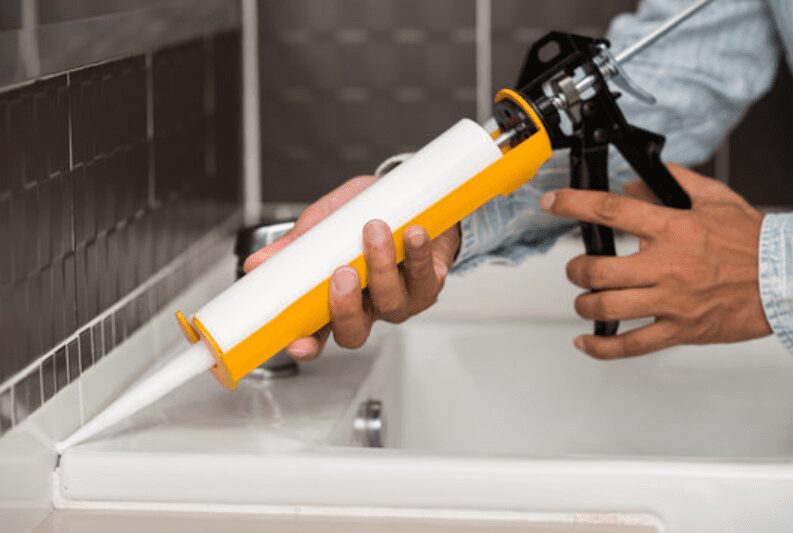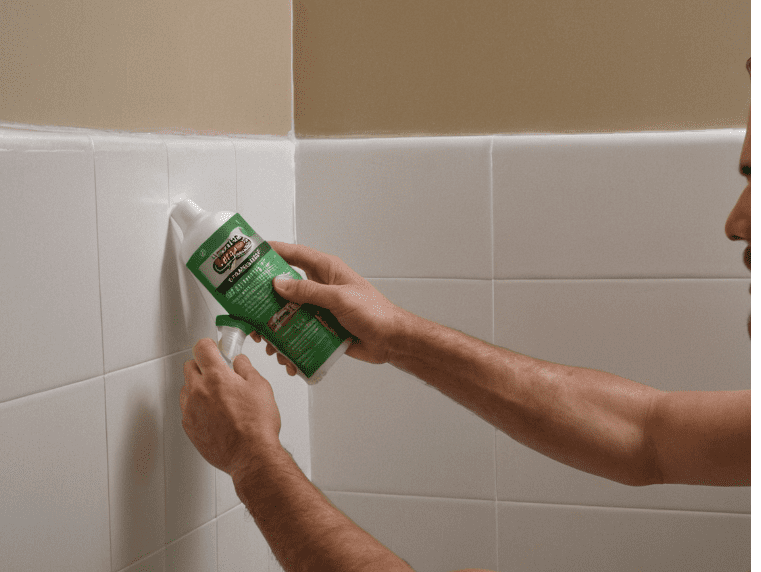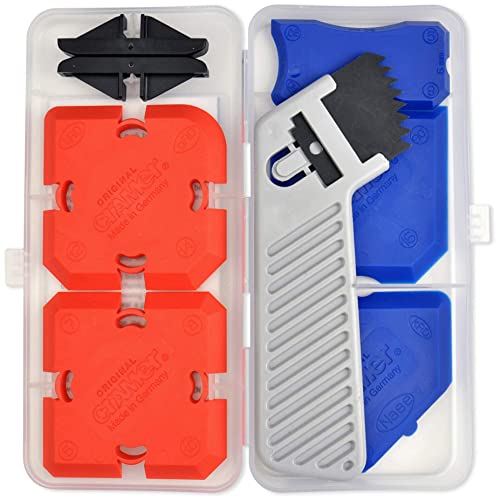
Choosing the right caulk for your shower or bathtub is more crucial than you might think. A poorly chosen caulk can quickly lead to frustrating problems like leaks, unsightly mold, and mildew growth.
That’s why selecting a caulk designed explicitly for the wet environments of your shower is essential. The best caulk for showers should be waterproof, mildew-resistant, and flexible enough to handle the shifting and settling in a bathroom.
What is Caulk and Why is it Important?
We’ll guide you through finding the top caulk for showers and the best bathtub caulk options and give you shower caulk recommendations to make your project successful.
Caulk fills gaps and joints in various surfaces, including bathroom tiles, bathtubs, and showers. Caulk is typically made of a polymer or silicone-based material that expands and contracts to fill gaps as they open and close due to temperature changes.
Caulking is crucial in showers and tubs as water can easily penetrate through gaps, leading to water damage, mold growth, and mildew. Mold and mildew thrive in high humidity and organic materials such as body oils, providing the perfect environment for mold spores to grow and proliferate.
There are several types of caulk, including silicone, latex, and hybrid caulk. However, not all caulks are suitable for showers and tubs, and selecting the right product requires consideration of several factors.
Caulk Alternatives
While caulk is a versatile solution for sealing gaps in your bathroom, sometimes it’s not the best answer. If you’re dealing with large gaps, cracked tiles, or structural issues, it might be necessary to explore other repair options before applying caulk.
- Silicone Sealant: For more significant gaps (over 1/4 inch), a pure silicone sealant is often better than a traditional caulk. Pure silicone offers superior flexibility and can create a wider seal, but it may be harder to work with. Silicone generally should not be painted over.
- Epoxy Grout: If you have cracked or damaged tiles, epoxy grout could be a solution. Epoxy grout is solid and durable, making it ideal for repairs as well as filling gaps. It’s waterproof and can add stability to loose or cracked tiles.
- Expanding Foam: For very large gaps or holes, expanding foam can be useful to fill the space before sealing. This is especially helpful if you have gaps around pipes or fixtures. Remember, expanding foam should be trimmed back when cured and then covered with caulk or sealant for a waterproof finish.
- Backer Rod: If the gap you’re trying to fill is too deep for caulk alone, a backer rod provides support. This is a compressible foam rod inserted into the gap before caulk. It prevents the caulk from sinking too deeply and ensures a properly shaped seal.
Important Note: If you suspect structural issues, such as damaged framing or water damage behind your tiles, it’s crucial to consult a professional before attempting any DIY repairs. Additionally, when removing old caulk, use a putty knife and a utility knife to avoid damaging the surface.
Factors to Consider When Choosing Caulk for Showers and Tubs: Preventing Mold Growth
selecting the ideal caulk for your shower:
- Waterproofness: The best caulk should create a completely watertight seal to prevent leaks and moisture from getting behind your tiles.
- Mildew Resistance: Look for caulk formulas with mildewcide additives to combat mold and mildew growth in the perpetually damp environment of your shower.
- Flexibility: A flexible caulk is essential to handle the movement and expansion naturally occurring in a bathroom. This prevents cracking and maintains a strong seal over time.
- Ease of Application: Some caulks are easier to work with than others; consider your experience level. Acrylic latex caulk is known for its ease of application, paintability, and superior adhesion properties.
- Cleanup: Do you prefer water-based caulks for easy soap and water cleanup, or are you comfortable with solvent-based options? Acrylic caulk offers a watertight seal, excellent adhesion properties, and fast drying time.
Latex Caulking: Why It’s a Popular Choice
- Easy to apply and clean up, as it can be smoothed with water and requires no special tools or solvents.
- Flexible and durable, as it can withstand temperature changes, moisture, and mildew without cracking or shrinking.
- Paintable and stainable, as it matches the surrounding surfaces’ color and texture.
- Environmentally friendly and safe, as it does not contain harmful chemicals or emit strong odors.
Top Caulk Products for Showers and Tubs
1. GE Silicone II Kitchen & Bath Caulk
GE Silicone II Kitchen & Bath Caulk is a high-quality silicone caulk formulated explicitly for kitchens and bathrooms. This water- and mold-resistant product offers excellent adhesion and flexibility, making it ideal for showers and tubs. It comes in various colors and is easy to apply and clean up.
- 100% Waterproof: This 100% silicone formula offers ultimate protection against water damage, providing a reliable seal in areas prone to consistent water exposure
- Strong and Flexible: Stays permanently flexible with a high-performing, durable seal
- 30-Minute Water-Ready: Ready for water exposure in as little as 30 minutes
- Shrink- and Crack-Proof: Withstands extreme expansion and contraction associated with temperature fluctuations
Before applying silicone caulking, ensure the surface is properly cleaned and dried to achieve the best adhesion and durability.
2. Dap 18001 Kwik Seal Caulk with 5.5-Ounce Tube
Dap 18001 Kwik Seal Caulk is another high-quality silicone caulk ideal for showers and tubs. This product is water-resistant, mold-resistant, and has excellent adhesion and flexibility. It also dries clear, making it ideal for
use on surfaces where appearance is essential. This product is easy to apply and clean up, making it a popular choice among DIYers and professionals.
3. Loctite Polyseamseal Tub and Tile Adhesive Caulk
Loctite Polyseamseal Tub and Tile Adhesive Caulk is a hybrid caulk that combines the benefits of silicone and latex caulks. This product is water-resistant and mold-resistant and offers excellent adhesion and flexibility. It is also paintable, making it ideal for use on surfaces that require painting. This product comes in a range of colors and is easy to apply and clean up.
4. Red Devil 0838 Kitchen and Bath Silicone Sealant
Red Devil 0838 Kitchen and Bath Silicone Sealant is a high-quality silicone caulk formulated explicitly for kitchens and bathrooms. This product is water-resistant and mold-resistant and offers excellent adhesion and flexibility. It also comes in various colors and is easy to apply and clean up.
5. Gorilla 100% Silicone Sealant
Gorilla 100% Silicone Sealant is a high-quality silicone caulk ideal for showers and tubs. This product is water and mold-resistant and offers excellent adhesion and flexibility. It is also paintable, making it ideal for use on surfaces that require painting. This product comes in various colors and is easy to apply and clean up.
Essential Caulking Tools for a Seamless Finish
To achieve a seamless finish, you need some essential caulking tools, such as:
- A caulking gun: This device holds the caulk tube and allows you to apply it with precision and control. Depending on your preference and budget, you can choose between manual or battery-powered caulking guns.
- Utility knife: This tool helps you cut the caulk tube’s tip at an angle and puncture the seal inside. Use a sharp utility knife to avoid damaging the line or creating uneven cuts.
- A caulk remover: It helps remove old or excess caulk from the surface before applying new caulk. You can use a scraper, a razor blade, or a specialized caulk remover tool.
- A caulk smoother: Helps you smooth out the bead of the caulk after applying it to the surface. For this purpose, you can use your finger, a wet sponge, or a specialized caulk smoother tool.
How to Apply Caulk to Showers and Tubs

Applying caulk to showers and tubs can be messy, but with the right tools and technique, it can be achieved with a professional-looking finish.
Tools needed:
Or You may wish to buy bestseller Caulkin tool kits; some include even caulking gun:
Steps:
- Clean the surface: Before applying caulk, ensure that the surface is clean and dry. Use a cleaning solution to remove any dirt, grime, or soap scum.
- Apply painter’s tape: Apply painter’s tape around the area you’ll be caulking to ensure that the caulk is applied in a straight line and prevent excess caulk from getting onto the surface.
- Cut the tip of the caulk tube: Cut the tip of the caulk tube at a 45-degree angle to ensure that the caulk is applied evenly.
- Apply the caulk: Apply the caulk in a continuous line along the gap or joint that needs to be sealed. Hold the caulk gun or squeeze tube at a 45-degree angle and apply consistent pressure to ensure that the caulk is applied evenly.
- Smooth the caulk: Use a caulking tool or your finger to smooth the caulk and ensure it’s evenly distributed. Wipe any excess caulk with a paper towel.
- Remove the painter’s tape: Remove the painter’s tape immediately after applying the caulk to ensure that it doesn’t dry onto the surface.
Conclusion
Choosing the right caulk for your bathroom protects your shower or tub from water damage, mold growth, and mildew.
Whether you’re re-caulking old caulk, filling in moldy caulk residue, or installing new caulk, selecting the right product for the job is important. Common types of caulk include acrylic latex, siliconized latex, and silicone caulk; each has its unique features and downside.
Before starting any caulking project, make sure to fully dry and clean the area, remove all old caulk residue, and double-check the size of the indentation point. Use a utility knife to scrape any old or cracking caulk, and use a lint-free rag or paper towel to wipe away any debris.
Smoothing out the new bead of caulk with a smoothing tool, your finger, or a hairdryer will help eliminate any gaps and ensure a watertight seal. Remember to allow sufficient time for the caulk to fully cure before using the shower or tub.
Investing in the right caulk and taking the time to do the job correctly can protect your bathroom from water leaks, mold growth, and other types of damage.
Right Caulk
If you’re having trouble choosing the right caulk or are unsure about the best method for removing old caulk or applying new caulk, plenty of resources are available to help you.
Faqs, tutorials, and step-by-step guides can be found online, and plenty of experts in the field can offer advice and recommendations. Additionally, manufacturers generally provide detailed instructions and product specifications to help users accomplish the job quickly.
Whatever kind of caulking project you have in mind, investing in suitable materials and processes will create a clean and fresh look that protects your bathroom and adds life to your project.
With accurate information and guidance, you can proceed confidently and complete your project professionally.
It’s important to note that caulking is not just limited to showers and tubs. It can also be used in sinks, toilets, trim, windows, and doors. When choosing a caulk, be sure to read the label carefully and select a product that is appropriate for your specific project.
Different caulks are designed for other materials and applications, so be sure to select the right type for the job. Additionally, follow all safety precautions when working with caulk, including wearing protective gear and using proper ventilation.
Final Word
Choosing the best caulk for shower applications is a pivotal step in any bathroom renovation or maintenance project, ensuring a durable and mold-resistant seal. The debate often narrows to silicone and latex caulk, each with its formula and merits for specific bathroom sealing needs.
Silicone sealant, celebrated for its waterproof and flexible characteristics, is the best silicone for shower environments and is adept at withstanding significant temperature fluctuations. Its superiority in creating a resilient barrier against water makes it the best shower caulk for areas constantly exposed to moisture.
On the other hand, latex caulk, often bolstered with acrylic for added durability, offers ease of application and cleanup, making it a practical choice for various home improvement tasks. While it may not boast the waterproof prowess of its silicone counterparts, high-quality latex products can still serve effectively in less moisture-prone bathroom areas.
Home Depot presents an extensive array of products for those embarking on this crucial sealing task, including the best silicone caulk for showers and specialized bathroom silicone sealant options designed to combat mold growth in perpetually wet conditions. Tools like the caulk gun and squeeze tubes aid in the precise application, ensuring an even distribution.
The best caulk for bathtub and shower projects often requires the removal of old caulk to prevent moisture buildup and ensure the new sealant’s effectiveness. Applying caulk can vary, from using a caulk gun for shower sealant to employing a wet finger for a smooth finish, indicative of professional workmanship.
Over time, choosing the best caulk for tub and shower areas, whether a silicone sealer known for enduring flexibility or a latex-based product for convenience, ensures a watertight bathroom. This preventative measure keeps water at bay and supports a clean, mold-free environment.
From bathroom caulk to bathtub sealant and from the best bath seal to bathroom sealant, the market offers a solution tailored to every need, solidifying the role of caulking in successful bathroom waterproofing and home maintenance narratives.
Last update on 2024-07-26 / Affiliate links / Images from Amazon Product Advertising API































